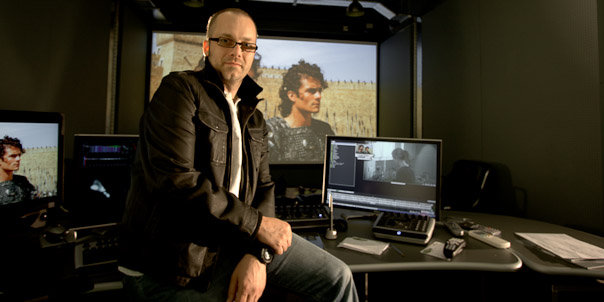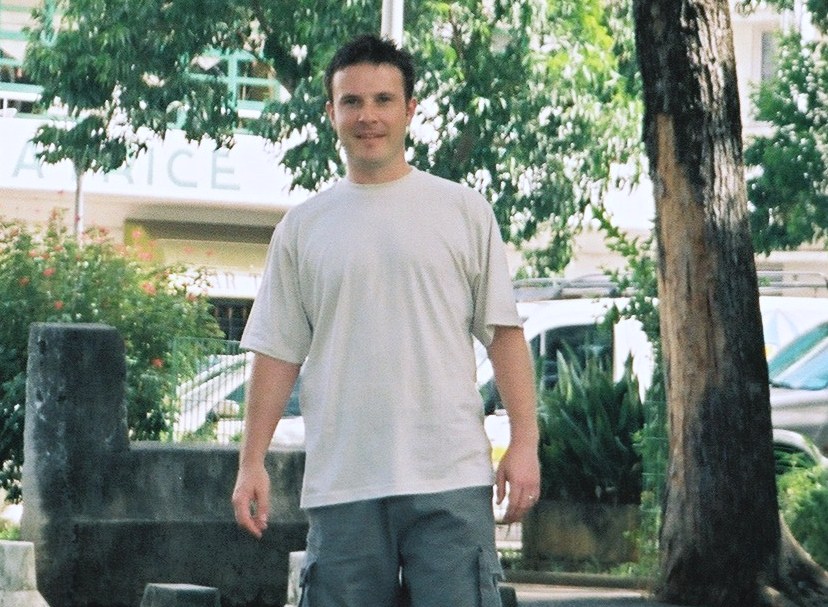ASK & DISCUSS
INDEXDo you need to spend a lot of money to get into the UK film industry to produce, write or direct movies?
10 years ago - Matthew Prince
Living in London, I've tried so many times to bring people together in groups and gone to seminars and courses, and advertised myself as a runner/production assistant. But I can't seem to find work or set up work. Do I have to have a lot of money to pay for big productions and that way people will work with me or pay for actual films to be made. I suppose if I was a millionaire I could just pay for films to be made!
Do you have to spend a lot of money to get into the UK film industry?
It may sound like a strange question, but to many people just entering or curious about the film industry, they will know where I'm coming from.
Only members can post or respond to topics. LOGIN
Not a member of SP? JOIN or FIND OUT MORE
10 years ago - John Lubran
I like that reference about luck Paddy. I always remember a very successful and entirely 'self made' chap who believed in evoking the power of luck but qualified it by saying that the harder he worked the luckier he got.
Response from 10 years ago - John Lubran SHOW
10 years ago - Paddy Robinson-Griffin
Off-topic, but I once worked at an IT company where one role had 200+ applicants CV's. The poor guy with the vacancy took the 3-inch pile of CV's, took about half of it, and unseen dropped them in the bin.
"Well, we wouldn't want to employ anyone who wasn't lucky now, would we?"
Response from 10 years ago - Paddy Robinson-Griffin SHOW
10 years ago - Lee 'Wozy' Warren
All brilliant insights above. You should read, then re-read the above.
Send me your CV and reel link (if any) and I'll see if I can find something for you to 'break in' on my next project.
Wozy
Response from 10 years ago - Lee 'Wozy' Warren SHOW
10 years ago - Tony Oldham
It is a tough business and the reality for many of us is that it's often necessary to take our future into our own hands i.e. take control of decisions by producing what we make, rather than constantly waiting on that 1000/1 shot of being chosen for that one special job that actually pays a fair wage.
We are fortunate to be living in the age of digital technology and DSLR's where films (including features) can be made by collaboration and a little time. Yes, we will make mistakes and sometimes produce bad results, but that is all part of the process of eventually making that one great film that brings much needed industry attention and stable employment.
Producing is tough, it is not for me, probably not for you, but if you want to make films, it's pretty straight forward. Go and make films, with or without money. I'm sorry you're having difficulty finding collaborators, but I'm sure with time and patience they will come.
I made my first feature for £1.3K with a cast of 14 and crew of just 3-4. I simply consider it my first stepping stone to better things and I'm pretty happy with it.
https://www.youtube.com/watch?v=zxrdzQHK6wU
It's a proactive business and sometimes very disheartening. But if you want to make films, we want to make films like a bad kind of addiction.
Best Wishes, Tony
Response from 10 years ago - Tony Oldham SHOW
10 years ago - Paddy Robinson-Griffin
Good post from Marlom.
My answer is yes, yes you need money. Everything costs money. And time. And time costs money.
Often it is the creative roles with the lowest /direct/ costs that are seeking collaboration with technical roles with higher direct costs. Direct costs are things you can attribute to a specific project, so for instance not a laptop or acting class (real costs and tools of trade certainly, but as overhead). There are a lot of creative people, fewer trades, so you end up with a position where many aspiring writers and directors are seeking collaboration with trades with overhead and opportunity costs in order to fulfill their creative vision. That's fine, but looking at it from a different angle, it's many hundreds of amateur creatives begging favours from dozens of trades who can rather pick and choose.
Can you name 5 great directors?
Can you name 5 great writers?
Can you name 5 great actors?
Gets trickier now...
Can you name 5 great producers?
And trickier again...
Can you name 5 great gaffers?
Can you name 5 great second assistant cameras?
Can you name 5 great location managers?
Can you name 5 great caterers?
How about digital effects technicians?
From this simple exercise, it's clear that the top three roles get all the glamour and recognition, even when some of those other roles will have had at least as much work to do on the project. With no showreel/star value, collaboration only has more of the day job and costs without much reward. Nobody wants a DVD or signed script of an amateur production (although they may regret that in 50 years when you're a Hollywood director and they can eBay it!), so it's really hard to motivate people to do you the favour over the next aspirant. Every favour is somebody subsidising your film career dreams, in a harsh light.
One of the biggest motivators you can get is money. I'll do you a favour for a day or two if I've nothing else on, but after that it's become a chore, and I'll want a reason to turn up. I still have rent to pay, kids to feed, dog to walk, life to live. That's how a lot of people think. You can't make a feature in a weekend, so a no-budget feature is basically doomed (unless you find other motivations for people and can cover their costs).
So, between renting kit, getting people to show up, insurances, legal costs, catering and expenses, travel, set dressing, printing, phone calls, office space, secure storage, and so on, it costs real money. There's no escaping most of these costs.
In fairness, a lot of dreadful films get made with modest budgets each year. You never see them because nobody buys them, but go to Cannes and walk the Marché and you'll see just how many are made, it's depressing and/or inspiring depending on how much you've got invested.
So, the eternal 'how to get money' question with its usual answers, I'm afraid. There aren't shortcuts that I've seen. Make money for investors, do it several times, each time they lend you more. There's no easy answer.
What may help somewhat is to offer even notional fees for your projects. £100 here or there goes a long way to help people know you're serious and not just another blagger wanting creative glamour without the cost. And do a lot of favours for other people and call them back in one day. And learn some of the skills for one of the trades. A good Grip will make real money but not have any glamour. Or train an an electrician and work up through the lighting department. Or as a short order chef and get to know a lot of film people quickly in the most positive light (ie feeding them) and begging favours?
Just some ramblings...
Response from 10 years ago - Paddy Robinson-Griffin SHOW
10 years ago - John Lubran
Making good films and making good money are not automatically connected. The fact that so many bad films have made money, and even fortunes, demonstrates just how important distribution is. There's folks out there who can sell snow to Eskimos. But if one can demonstrate an enhanced ability the potential of getting into more rewarding projects is much improved.
The fragmentation of the old film and TV business models, consequential to the massively expanded number of distribution platforms sharing a budget that's not expanded, at anything like the same rate, means that career paths modeled on those grand old and extremely well paid doyens of the 'golden age' are fading into history. However there are still opportunities to forge careers that can earn more than enough to be the 'day job'. One of them is through fully front loaded free distribution. Free distribution, cognoscently designed and managed, means massive audiences in every platform, which incentivises budgetary front loading. I'll leave it to the reader to extrapolate how that might be achieved because the ability or inability to discern that extrapolation is a prerequisite of being a contender. Don't want to encourage too big a band wagon just yet do we!? One thing that remains essential however is quality and relevance. Clearly, amateurish, naive and inane projects are unlikely to succeed.
Response from 10 years ago - John Lubran SHOW
10 years ago - John Lubran
Such excellent ramblings as experience makes!
The only other observation I'd make to add to Paddy and Marlom's eloquent and learned contributions is of the power of actual brilliance illuminating a dull and repetitive arena, whether it be with a script or other creative content, a unique and compelling business/distribution plan that has traction beyond the established norms or even with that 'un-analysable' phenomenon of personal magic. In an over crowded market lateral thinking sometimes trumps linear processes. However such miracle workers are mostly born rather than made but sometimes they need to be awakened to their own powers! Grace seems to enhance such magic considerably.
Response from 10 years ago - John Lubran SHOW
10 years ago - Marlom Tander
First up, most people who want to get into the industry, fail.
There is a vast number who want to break in, and not enough work. What work there is, goes to "trusted hands" because any weak member of the team can really cost a bloody fortune.
The Golden Rule is simple - He who has the money, makes the rules.
Also note that people willing to give people a break will usually choose those who are "busy waiting for a break" rather than "just waiting". Trust me, whatever the role, there are plenty of both to choose from.
1) You want to spend someone else's money? They have to like you.
Basically, they have to KNOW you and TRUST you, and when you're trying to break in, that's basically a networking issue. If they look at CV's, there's always better people.
The more people you have networked with and who have put you in their "good people" list, the better the odds.
Seminars and courses should be assessed mainly on their networking opps (unless properly technical).
Network with your peers. It's when one of them gets a break that you get a call. Because they don't know who the "trusted hands" for entry level jobs are.
INTERNING or basic entry jobs with existing companies can be useful, if you can afford it as they give you that "pro" tag and mean that you're "one of us, not a wannabe" in the industry. (I have big issues with unpaid internships, but if you have to....). The competition is huge though.
YOUR OWN PRODUCTION COMPANY. Go hustle for commercial and corporate work. You might find yourself with a business, or at least self funding for good shorts or even cheap features. It also gives you that "pro" tag. It can help with hustling for funds for other projects - funders know you can handle people, projects, and budgetsm, and appreciate the importance of revenue.
2) You intend to spend your own?
You make the rules. At least as far as spending the money goes. But the market decides your returns.
DO NOT SPEND MORE THAN YOU CAN 100% write off.
a) SHORTS - the only shorts worth spending money on (bar zero budget practice ones) are ones that will be brilliant. Brilliantly written, acted, edited and technically produced.
If your planned short isn't going to place at an IMDB qualifying festival, or some other important (taken seriously by the industry) festival/comp, or be targeted directly at someone who can commission you, then you might as well burn the money.
(Obviously your short might not place. My point is, be clear eyed and ruthless BEFORE you write cheques. If your actor mate is wrong for the part, drop him or change the script to suit him. If your cast is weak but your focus is shooting technical, fine, just know this is a practice short and spend accordingly).
b) FEATURES - ditto, but with knobs on because the risk is so much greater.
HOWEVER you can also make a Feature IF you are confident that you can make money from it. Well executed genre stuff can tick this box IF you understand your market, what it wants and how to reach it cost effectively AND that you can deliver to the required production values. [BIG IF's BTW].
c) YOUTUBE - create a hit channel. Zero budget can work. It's all about imagination and zeitguest. Hint, arty episodic dramas don't seem to work. Carefully edited cats, OH YES. Cats in Minecraft? Kerching!
You may laugh, but it keeps you active and filming, and that gives you something REAL to talk about at networking, shows commitment, and provides practice, and practice makes perfect.
d) OTHER PROJECTS - this is mainly reportage/docu type territory but if that appeals, then it works as per YT but in a more industry serious way.
Even if it doesn't appeal, recognise the CV value of delivering well executed projects.
E.g. http://www.bangerrallychallenge.co.uk/ - instant scope for a start to finish comedy docu of you and your mates failing dismally to win. Given that your mates are paying their way (c'mon guys, ADVENTURE!), it's only a few hundred quid investment. But you can make it look much more. If your mates can act you could even deliver a short/feature set in the event. A budget version of the Steve MaQueen's LeMans, or a glorious and in memorium piss take of Top Gear :-)
Note also that IF you managed to pull it off the feat is more impressive as people who matter will understand the constraints and pressures you were under - e.g. a whole lot of "one chance only" shots.
For the more serious - shooting community stuff, local bands, events etc is good.
good luck
Response from 10 years ago - Marlom Tander SHOW
10 years ago - Paddy Robinson-Griffin
BTW not wanting to put a downer, just help put it in context. Nobody gets given a million quid without being worth it, so play the long game and build up.
You will almost certainly need a day-job. Most actors have day jobs. Most upcoming musicians have a day job. Most emerging artists have a day job. Get a day job, and maybe a second one. JK Rowling was a single mother writing in stolen moments in cafés. Even becoming a short-order chef you will be useful on film sets ;-)
If you want to write, write at every opportunity. Write imaginary speeches, write short stories, write prose. If you want to direct, analyse all the great films and directors, get your phone camera and become a megastar on YouTUBE for 30-second, daily, perfect little films you make with a cast of lego people. Become brilliant at knowing your framing, timing, storytelling. Develop a style.
Basically be the best you can be in the gaps between work, and get your body of work right up. Then get lucky and be in the right place at the right time. Determination is incredibly powerful - by doing doing doing one step at a time it sends a potent signal that you're not just a wannabe, but a doer :-) People like that.
Response from 10 years ago - Paddy Robinson-Griffin SHOW
10 years ago - David Graham Scott
I've won a few awards (eg Best UK Doc at last years Open City Docs fest) and had my docs broadcast but still having to go back to day-job work.
Response from 10 years ago - David Graham Scott SHOW






